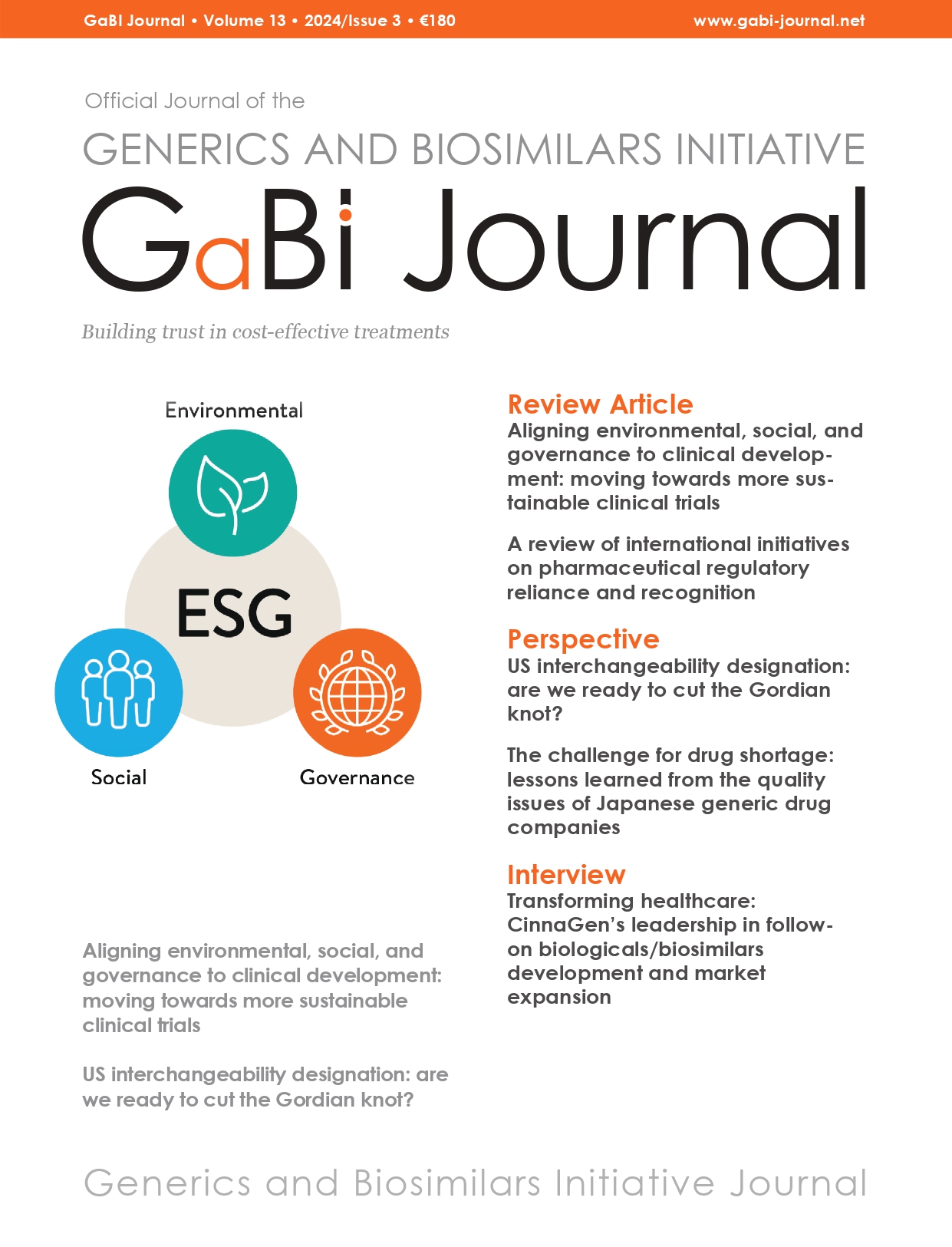A clinician’s view of the ethics of the use of biosimilars
Published on 2012/10/11
Generics and Biosimilars Initiative Journal (GaBI Journal). 2012;1(3-4):112.
|
Abstract: |
Submitted: 8 October 2012; Revised: 9 October 2012; Accepted: 9 October 2012; Published online first: 11 October 2012
In the European Union the word ‘biosimilar’ denotes a copy version of an already authorized biological medicinal product with demonstrated similarity in physicochemical characteristics, efficacy and safety, based on a comprehensive comparability exercise [1]. The ‘comprehensive comparability exercise’ is more extensive and complex than what is required for market authorisation of generics to account for the more complex nature of biopharmaceuticals compared to ‘conventional’ small molecule medicinal products. The particular risks that make the more complex regulatory process necessary are mostly related to the manufacturing process used for biologicals. Similar risks are associated with the changes that are not infrequently made to the manufacturing process of originator (reference) biological medicinal products during their life cycle, and when this occurs a regulatory comparability exercise is also required for the originator [1].
There is no evidence that the benefit–risk ratio of biosimilars authorized after successfully passing the regulatory ‘comprehensive comparability exercise’ would be notably different from that of the originator biological during its life cycle. It is also important to note, that the comprehensive comparability exercise requirement is not limited to quality and safety, but also covers efficacy.
The physician prescribing a medicine, and the patient taking it, should be able to trust that during the regulatory approval process, be it for a ‘conventional’ pharmaceutical product or a biological one, the benefit–risk ratio in relation to quality, safety, and efficacy of the product has been properly evaluated and found favourable. In the case of both generics and biosimilars, regulatory approval should be a sign that benefits and risks are similar enough to the originator. With time, new evidence may emerge, that requires re-evaluation of the risks and benefits of a product. This happens for all types of pharmaceutical products, even some very old ones.
For me the possibility that there are unknown clinical safety issues associated with the use of authorised biosimilars is a research question, not an ethical question. The ethical question may then be a research ethics question. Or if put, as the author of the letter suggests [2], that ‘biosimilars, or any other medicinal products, are approved for use to save money for the society, without appropriate knowledge of safety consequently putting individuals at risk’, then the key ethical question concerns the inappropriate regulatory approval, not the product’s safety. If biosimilars are used without appropriate approval, the ethical question is the same as in any other unlicensed/off-label use, use without appropriate knowledge of quality, safety, efficacy. When approved medicinal products are given for the benefit of somebody other than the person receiving the therapeutic benefit, the intervention, e.g. stem-cell donation; has to be ethically acceptable, the safety of any medicinal product to be given has to be based on data and assessed as acceptable compared to its demonstrated efficacy (in relation to the intervention). The ethical questions are not different whether a biosimilar, or an innovator biological product, or a small molecule medicinal product is given.
Competing interests: None.
Provenance and peer review: Commissioned; internally peer reviewed.
References
1. Weise M, Bielsky MC, De Smet K, Ehmann F, Ekman N, Narayanan G, et al. Biosimilars-why terminology matters. Nat Biotechnol. 2011;29(8):690-3. Epub 2011 Oct 09.
2. Petrini C. A bioethicist’s view of the use of biosimilars. Generics and Biosimilars Initiative Journal (GaBI Journal). 2012;1(3-4):110-1. doi:10.5639/gabij.2012.0103-4.034
|
Author: Kalle Hoppu, MD, PhD, Medical Director, Poison Information Centre, Helsinki University Central Hospital, PO Box 790, 17 Tukholmankatu, FI-00029 Helsinki, Finland |
Disclosure of Conflict of Interest Statement is available upon request.
Permission granted to reproduce for personal and non-commercial use only. All other reproduction, copy or reprinting of all or part of any ‘Content’ found on this website is strictly prohibited without the prior consent of the publisher. Contact the publisher to obtain permission before redistributing.
Related articles
The ethics of biosimilars
A bioethicist’s view of the use of biosimilars


